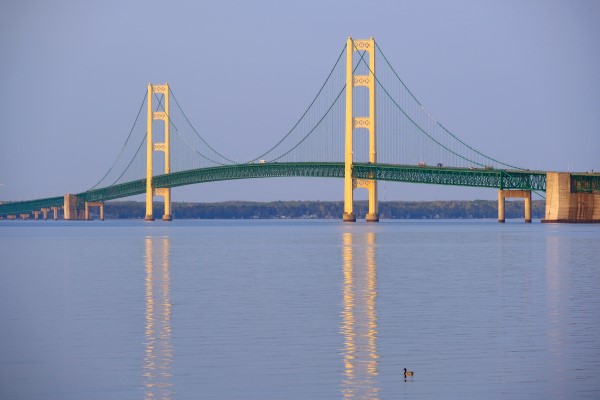Michigan Court Backs Permits for Enbridge’s Line 5 Pipeline Tunnel Project
(P&GJ) — A Michigan appeals court has upheld state permits for Enbridge Energy’s proposed tunnel project beneath the Straits of Mackinac, rejecting legal challenges from environmental groups and Native American tribes, according to the Associated Press (AP).
The ruling allows Enbridge to move forward with its plan to encase a section of its Line 5 pipeline in a protective tunnel.
The Michigan Court of Appeals determined that the Public Service Commission acted appropriately in issuing permits for the $500 million project.
According to AP, opponents had argued that regulators failed to assess whether the pipeline itself remains necessary and overlooked the environmental impact of fossil fuels. However, the court found no grounds to overturn the commission’s decision, concluding that it was comprehensive and reasonable.
RELATED: Army Corps Lists Enbridge’s Line 5 as ‘Emergency’ Project Eligible to Bypass Environmental Review
Enbridge has operated Line 5 since 1953, transporting crude oil and natural gas liquids between Wisconsin and Ontario. The pipeline runs along the bottom of the Straits of Mackinac, where safety concerns have intensified in recent years. In 2017, Enbridge disclosed that its engineers had known about coating gaps on the pipeline since 2014. The following year, a boat anchor strike further raised fears of a potential spill.
Despite maintaining that the line remains structurally sound, Enbridge agreed in 2018 to construct the tunnel under an arrangement with former Michigan Gov. Rick Snyder. The tunnel would enclose a four-mile segment of the pipeline to provide additional protection.
Although the appellate ruling supports the project, Enbridge still faces additional legal and regulatory barriers. Michigan Gov. Gretchen Whitmer opposes the continued operation of Line 5, and Attorney General Dana Nessel is pursuing a separate lawsuit to revoke the easement allowing the pipeline to operate beneath the Straits. That case, currently in a state court, could result in further legal complications for Enbridge.
The company must also secure a permit from the Michigan Department of Environment, Great Lakes, and Energy, as well as federal approval from the U.S. Army Corps of Engineers before construction can proceed. Environmental advocates remain concerned that federal regulators may expedite the approval process, particularly under policies favoring energy development.
Despite these challenges, Enbridge welcomed the court’s decision.
Related News
Related News

- Kinder Morgan Proposes 290-Mile Gas Pipeline Expansion Spanning Three States
- Enbridge Plans 86-Mile Pipeline Expansion, Bringing 850 Workers to Northern B.C.
- Intensity, Rainbow Energy to Build 344-Mile Gas Pipeline Across North Dakota
- Tallgrass to Build New Permian-to-Rockies Pipeline, Targets 2028 Startup with 2.4 Bcf Capacity
- U.S. Moves to Block Enterprise Products’ Exports to China Over Security Risk
- U.S. Pipeline Expansion to Add 99 Bcf/d, Mostly for LNG Export, Report Finds
- A Systematic Approach To Ensuring Pipeline Integrity
- US Poised to Become Net Exporter of Crude Oil in 2023
- EIG’s MidOcean Energy Acquires 20% Stake in Peru LNG, Including 254-Mile Pipeline
- Enbridge Sells $511 Million Stake in Westcoast Pipeline to Indigenous Alliance





Comments